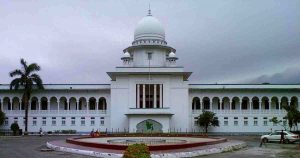The Appellate Division of the Supreme Court yesterday fixed Wednesday (today) for delivering its order on the review petition filed by death-row convict Jamaat leader Ali Ahsan Muhammad seeking reconsideration of his death penalty for wartime offences.After concluding hearing from both sides, the four-member bench of the Appellate Division headed by Chief Justice Surendra Kumar Sinha fixed the date for pronouncement of the verdict.
The four-member judges of the apex court started the review hearing at about 9.05 am with the arguments of defence lawyer Advocate Khandaker Mahbub Hossain.
Hossain told the court that his client was not a commander of Al-Badr forces as Al-Badr force was operated and led by Pakistan military, which was cleared from the many evidences including from the book of ‘The Vasquez Generals’ written by Muntasir Mamun. Hence, Ali was not its commander at all, he added.
The principal defence counsel also said that his client Ali was not involved in any incidents of killing, arson or disappearance during the War of Liberation, which was clear from the prosecution witnesses’ statements. However, the tribunal and the apex court awarded death penalty to Ali as a commander of the auxiliary force, Al-Badr.
During the Liberation War, Ali was a student aged only 23. How could a 23-year-old student be made commander of the auxiliary force? Besides, the investigation officer of war crimes cases had confessed that Ali’s name was not found in any of the auxiliary forces – Al-Badr, Razakar or Al-Shams. Even Ali’s name was not included in the list of Al-Badr and collaborator forces in the report submitted by the investigation officer before the court; Hossain added.
Ali had no direct participation in the killings of intellectual during the 1971 liberation war. But, the tribunal and the apex court was wrongly sentenced to death saying that he was sentenced to death for his commanding or superior responsibility in the intellectual killing being the commander of Al-Badr force and president of Islami Chhatra Sangha.
Ali should not be convicted for superior responsibility in intellectual killing as the Al-Badr was under the command of notorious Pakistani Army.
Hossain also said that at least 42 cases were filed against Razakar Al-Badr men and 50 persons were arrested following the filing of cases. But, the name of Ali Ahsan Muhammad Mujahid was not mentioned in any of the cases even the prosecution witnesses did not identify Mujahid as the killer of any person during the Liberation War in 1971.
At a one stage of hearing, the chief justice SK Sinha wanted to know from the defence counsel whether he wants the commutation of Ali’s death penalty.
Hossain replied said that he wanted acquittal order from the court on behalf of his client as his client was not involved in any crimes during the Liberation War in 1971.
Opposing his submission, attorney general Mahbubey Alam told the court that Ali Ahsan Muhammad Mujahid was a commander of Al-Badr force during the Liberation War.
Hundreds of intellectual people were killed in a planned way during the Liberation War. Ali was a planner as he was chief of ‘Chhatra Sangha’. He could not avoid his responsibility in committing crimes against humanity during independence war. Hence, the apex court verdict should be upheld, he added.
The apex court had rightly awarded the death penalty to Ali considering his wartime offences. There is no scope to consider the review petition. If the review petition will consider, the nation and the prosecution would become frustrated, he noted.
Meanwhile, the same bench of the Appellate Division deferred the hearing of another review petition filed by death-row war crime convict BNP leader Salauddin Quader Chowdhury seeking reconsideration of his death penalty for wartime offences.
Soon, after concluding the hearing of Ali’s review petition, the apex court wanted to start the hearing on the SQ Chowhury review petition. But, the defence lawyer submitted a time petition to adjourn the hearing on the review petition.
In response to the time petition, the chief justice SK Sinha said that the hearing on the review petition filed by Salauddin Quader Chowdhury ‘not today’.
Attorney general Mahbubey Alam told reporters that the apex court will hear Wednesday (today) on the review petition of SQ Chowdhury.
The four-member bench of the apex court had on November 2 fixed November 17 for hearing on both the review petitions. The apex court fixed the date following a moved by Principal Counsel for Mujahid and Chowdhury, Khandaker Mahbub Hossain seeking more time for preparation.
On October 14, Mujahid and Chowdhury had filed separate review petitions with the Supreme Court for reconsideration of their death penalties for wartime offences.
Mujahid’s counsel Advocate Shishir Munir had submitted a 38-page review petition before the apex court, containing 32 grounds for reconsideration while Chowdhury’s lawyer Hujjatul Islam Khan Alfesani had submitted a 108-page petition before the SC, containing 10 grounds for reconsideration.
On July 17, 2013, the International Crimes Tribunal (ICT) sentenced Mujahid to death for killing intellectuals during the Liberation War. Later, Mujahid moved the Appellate Division against the verdict but the apex court, on June 16, upheld ICT’s verdict.
On October 1, 2013, the then ICT-1 found Chowdhury guilty of crimes against humanity, including rape and mass killing, during the Liberation War and condemned him to death.
On October 29 the same year, Chowdhury filed an appeal with the Appellate Division of the SC against the ICT-1’s verdict. On July 29 however, the apex court upheld the verdict of the then ICT-1.
Presently, Chowdhury is in Kashimpur Jail while Mujahid is in Dhaka Central Jail. The review petitions are the duo’s last resort to evade execution. In the event the apex court does not allow review petitions, they will be left with just one alternative – seeking Presidential clemency.




